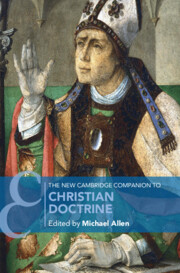Book contents
- The New Cambridge Companion to Christian Doctrine
- Cambridge Companions to Religion
- The New Cambridge Companion to Christian Doctrine
- Copyright page
- Contents
- Contributors
- Preface
- Part I Doctrines
- Part II Movements
- 11 Feminist Theology
- 12 Theological Interpretation of Scripture
- 13 Radical Orthodoxy
- 14 Public Theology
- 15 Disability Theology
- 16 Black Theology
- 17 Pentecostal Theology
- 18 Analytic Theology
- 19 Apocalyptic Theology
- 20 Reformed Catholicity
- 21 Ressourcement Thomism
- Index
- Cambridge Companions to Religion (continued from page iii)
- References
21 - Ressourcement Thomism
from Part II - Movements
Published online by Cambridge University Press: 03 November 2022
- The New Cambridge Companion to Christian Doctrine
- Cambridge Companions to Religion
- The New Cambridge Companion to Christian Doctrine
- Copyright page
- Contents
- Contributors
- Preface
- Part I Doctrines
- Part II Movements
- 11 Feminist Theology
- 12 Theological Interpretation of Scripture
- 13 Radical Orthodoxy
- 14 Public Theology
- 15 Disability Theology
- 16 Black Theology
- 17 Pentecostal Theology
- 18 Analytic Theology
- 19 Apocalyptic Theology
- 20 Reformed Catholicity
- 21 Ressourcement Thomism
- Index
- Cambridge Companions to Religion (continued from page iii)
- References
Summary
Ressourcement Thomism refers to an emergent trend of theologians who seek to reassess the contribution of Thomas Aquinas both within his historical context and in a contemporary context. It is best explained genealogically in relation to other recent theological movements and has distinctive characteristics. In this chapter, I seek first to identify this historical context and characteristics of Ressourcement Thomism and then to illustrate its relevance by examining two typical theological claims found among those associated with the movement. The first of these is the claim that the modern focus on the “immanent and economic trinity” after Karl Rahner is conceptually problematic and that the Thomistic distinction between Trinitarian processions and Trinitarian missions serves as the more feasible one for a reasonable analysis of the way that the mystery of the Trinity is revealed in the economy of salvation. The latter model allows one to acknowledge more perfectly the New Testament revelation of the transcendence and unity of the Trinity and to avoid problematic historicizations of the divine life of God. The second claim is that key figures in modern kenotic theology such as Karl Barth and Hans Urs von Balthasar, despite their theological creativity, have failed to preserve a sufficient sense of the distinction of the divine and human natures in Christ. Aquinas’s Chalcedonian and dyotheletist Christology provides one with ways of thinking about how the crucifixion of God reveals the mystery of the Trinity in and through the sufferings of Christ without the problematic projection of human characteristics of the Lord onto the inner life of the Trinity, as constitutive of the inner life of the Trinity. In both these respects, Ressourcement Thomism as a theological movement suggests ways that historical theology that is concerned with the contribution of patristic and medieval sources can lead to a renewal of and creative engagement in modern theology.
- Type
- Chapter
- Information
- The New Cambridge Companion to Christian Doctrine , pp. 352 - 370Publisher: Cambridge University PressPrint publication year: 2022

